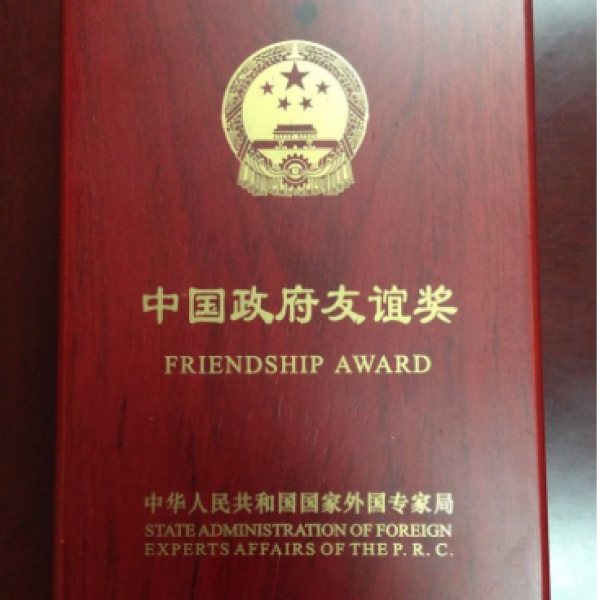The Friendship Award is the highest honor given to foreign experts by the People's Republic of China.
Cornell Professor John E. Hopcroft receives the award in a ceremony at the Great Hall of the People in Beijing on September 29, 2016.
The People's Republic of China Friendship Award is awarded annually to foreign experts who have made significant contributions to the country's economic and social progress. First established in the 1950s, it was awarded primarily to Soviet and East European nationals working in China. The award was abolished in the early 1960s following the Sino-Soviet split, but it was reintroduced in 1991. Since then, the winners have been selected by the Chinese State Administration of Foreign Experts Affairs. The award is conferred as part of the celebrations for the National Day of the People's Republic of China on October 1. Each year 50 foreign experts receive the award.
Hopcroft will become the second Cornellian to receive the Friendship Award. Previous awardees include former Cornell University President Jeffrey S. Lehman ’77, founding dean of the Peking University School of Transnational Law. This school was modeled on the American style of law school and was the first in mainland China to offer classes leading to a JD degree.
“We cannot waste a significant fraction of the world’s talent. Improving education in China is an opportunity to improve the lives of tens of millions of individuals,” said Hopcroft.
Hopcroft—the IBM Professor of Engineering and Applied Mathematics in Cornell University’s Department of Computer Science, and a member of the university’s Internationalization Council—served as dean of the College of Engineering from 1994 until 2001.
“We cannot waste a significant fraction of the world’s talent. Improving education in China is an opportunity to improve the lives of tens of millions of individuals,” Hopcroft says. “This is also an opportunity for Cornell to truly become an international university—by committing to help other countries improve their educational systems.”
Earlier this year Hopcroft received the 2016 Microsoft Research (MSR) Outstanding Collaborator Award. He was recognized as a strong advocate for MSR among talented students in China—MSR Asia reports that it has hired more than half of Hopcroft’s computer science undergraduates as interns.
Hopcroft has a long-held interest in global educational reform, and over the course of his career he has worked in a number of countries, including Brazil, Chile, Colombia, India, Mexico, Saudi Arabia, and Vietnam. “I suspect that once you start, the leaders talk to one another and then you get asked by various other countries to help,” says Hopcroft.
Hopcroft has been working to improve post-secondary education in China for the past five years.
“At first, I was asked to help improve 1,000 second- and third-tier institutions,” he says. “China would select a city where there were 50 universities, and I would work with 50 faculty—one from each institution—to improve teaching. After three such attempts, we decided a better strategy would be to work as councilor to the president of one of the top universities to improve the production of PhDs. Our thinking was that these graduates would then accept positions and help upgrade second- and third-tier institutions.”
Four years ago Hopcroft started working at Shanghai Jiao Tong University (SJTU). He has since taught two courses a year there, one during Cornell’s winter break and one during the summer. He has also helped SJTU implement a tenure system, hire and evaluate faculty, and implement strategic changes to improve educational outcomes.
Three years ago Hopcroft helped create an informal program to allow 30 elite Chinese students from SJTU to visit Cornell in July, at the end of their junior year. Since then, the program has helped Cornell attract one or two outstanding PhD students each year. In summer 2016, the program expanded to include an additional five students from Tsinghua University and four from Wuhan University.
“In the physical sciences and engineering, the quality of graduate students is perhaps the most important factor in the quality of the institution,” explains Hopcroft. “Building a relationship with institutions in China is helping Cornell attract top PhD students.”
More recently Hopcroft has been advising Premier Li Keqiang on a nationwide strategy to improve education. Li is China's head of government and the second-ranked member of the Politburo Standing Committee, the top decision-making body of the country.
“While elite programs in China are world-class, they are not enough to solve China’s problems,” says Hopcroft. “China needs to improve education for the tens of millions of students in the nation. It is a question of scale.”
At present Hopcroft is focused on issues that will impact education nationwide in China. Key issues include:
- Helping to ensure that China’s 1,500 university presidents are evaluated on the quality of the undergraduate education at their institution
- Revising the promotion process so that junior faculty will no longer work for senior faculty and will engage in the research that excites them
- Separating basic research from applied research
- Increasing faculty salaries based on merit
A proposal to address these issues was drafted by a three-person committee, chaired by Hopcroft, and has been submitted for consideration to Premier Li Kequiang.
“I believe that this is the work for which I am being honored with the Friendship Medal,” Hopcroft says.
Excerpted from an article on Global Cornell.



